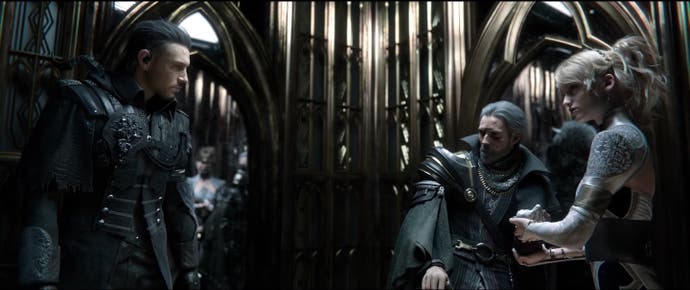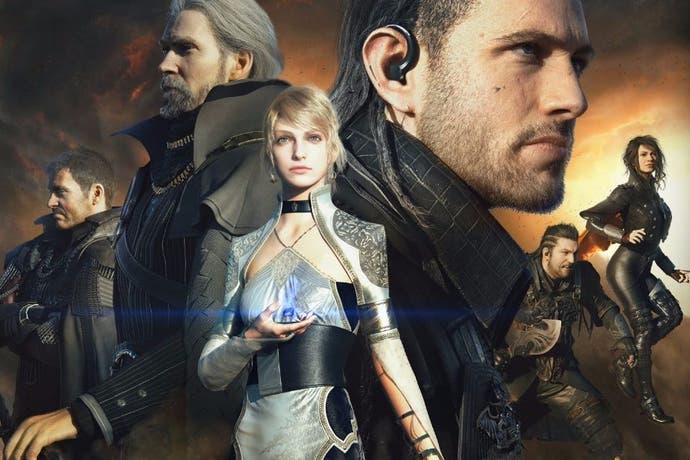Kingsglaive isn't a great movie, but it's a good intro to Final Fantasy 15's fascinating new world
Noct like this.
I remember when Final Fantasy 7: Advent Children came out 11 years ago. My friends and I had been following its development online for what seemed like forever, stalking fan forums and scouring for any grainy stills uploaded from Famitsu. Since we absolutely couldn't wait any longer, we downloaded an awful quality Japanese rip of the film along with a fan sub that was only barely coherent. These were characters we'd wanted to see in action again since we were children, and coming from it at that angle, even with our horrible bootleg copy, it didn't disappoint. Advent Children is not a good film, I know this, but for all the meaningful stuff it worked to undo from the game and for all the awful characters it introduced, I was just excited to see Tifa be a complete babe while being thrown by the leg around a ruined church. That fight with Bahamut Sin was all I'd really wanted from the film's entire 101 minute running time.
Advent Children demanded that you care about the characters and the world to be invested in the nonsense of the film, so it's a bold move by Square to attempt the same trick in reverse, essentially releasing Final Fantasy 15's opening cutscene as a standalone film several months before players will be able to immerse themselves in its world. But, for the most part, it works. It doesn't focus on the game's protagonist Noct, but takes place roughly around the same time as the start of the game, depicting the actions that set the game's main plot in motion with a lengthy flashback providing context to the ongoing political machinations.
Simply put, there are two warring nations, the technologically advanced bad guys Niflheim, and the good guys of Lucius, ruled over by Noct's dad, King Regis. Niflheim has taken over pretty much the entire world bar Insomnia, the capital city of Lucis, which is protected by a magical crystal that gives King Regis and his elite protectors, the Kingsglaive, magical powers. Niflheim really wants that crystal, basically. Focusing on N Ulric, a refugee and a member of the Kingsglaive, the film takes place almost entirely within Insomnia as Lucis and Niflheim come close to signing a peace treaty. All this is exactly as waffly as it sounds, but thankfully there are other, smaller conflicts within the film that are far more worth our time and attention.
The performance capture is out of this world impressive and the visuals, particularly the fight scenes, are consistently stunning and beautifully choreographed. It's everything you'd hope a Final Fantasy battle would look like in real-life, while Kingsglaive works well as a proof of concept of the wider world of Final Fantasy 15. If you found it difficult to see how Audis and ads for Beats by Dr Dre and real, modern cityscapes could work side by side with magic and giant Weapons and impossibly shiny suits of armour, Kingsglaive has it all sitting side by side quite comfortably.
What doesn't work so well, however, is the story. It starts with an exposition-heavy flashback and never really stops trying to ham-fistedly cram unnecessary information into every syllable uttered. At one point, a tertiary character is killed. Despite them having very little screen time, I was genuinely invested in their death, because I liked what little I'd seen of them when they were alive. Job done. But no, even after they'd died, the film thought it was important to keep piling on more exposition about how they were raised in an orphanage and that'd had ever such a hard life and oh look isn't that sad? Kingsglaive doesn't trust that you'd join the dots of a plot point or feel something all by yourself, so it has to double down and tell you everything outright as well, just to make sure you've got it. It's irritating and more than a little patronising, and it's painfully clear in life or death moments when characters should be springing into action and instead stand around talking about how they should spring into action for a couple of minutes before actually doing anything. It's unnecessary, especially now that technology has reached a point where their feelings are much more adequately and quickly conveyed through facial expressions and body language.
Dialogue is the film's weakest aspect, by far. Actors like Aaron Paul do their best with the cumbersome lines they're given, and as a result protagonist N is likeable despite his mullet and half-baked emotional baggage involving his left-behind family. Lesser characters are not so lucky. Many seem completely disconnected from their own voice - visibly elderly members of the royal council speak like much younger individuals - but mostly they just don't have very good material to work with. N's best friend Libertus (apparently the brother of the game's Gladiolus) is universally awful; his lines are poorly read and his character arc wholly unbelievable - so it's a shame Kingsglaive tasks him with doing much of the emotional heavy-lifting early on. The film is markedly improved around the second act, when he disappears off-screen for a while.

Princess Lunafreya is a total bore who has absolutely no agency of her own and just drones on and on about duty to her prince and honour to her king and how she doesn't care about death in the slightest because that's how relentlessly dull she is. Much of the film would have been improved had she been replaced with something else everyone could fight over, like a pencil sharpener or a hotdog or an old boot. In fact, her role does get usurped by an inanimate object in the end, and we're all the better for not having to look at her wan, completely blemish-free face as she gets pulled in multiple directions by literally everyone around her. I'm not surprised that Square has fallen back on the old damsel in distress trope, but surprised at just how hard they rely on it here, with a full-grown woman who has all the self-preservation skills of a toddler. King Regis is similarly one-note in his obsession with duty and family and looking sufficiently weary, but he at least gets a couple of cool fight scenes out of it all. I'm not sure he always comes off as likeable and beneficent as the film intends him to, but that at least helps keep things interesting and above all, relatable.
And it's when Kingsglaive remembers to be relatable - when it isn't just throwing a fight scene at you - that it really works. It doesn't allow itself the luxury often, but when it moves away from the gleaming palaces, pretty as they are, and into the Midgar-like slums, that's when we see a glimpse of the camaraderie that made old Final Fantasy parties come to life. Speaking of older Final Fantasies, there are a surprising amount of callbacks to them here, actually, including some major setpiece summons and monsters that long-time fans will recognise instantly, even if they've been given a bit of a facelift. There are other pleasing nods here and there. From someone remarking that their kebab tastes like a Chocobo turd, to a Marlboro keyring, and to what looks suspiciously like dried cactuars hanging in a vendor's fast food shack, the film doesn't get mired in nostalgia, but it doesn't forget its roots either.
I'm trying to pin down why exactly I enjoyed Kingsglaive, despite the fact that there is much of it that's bloated and badly done. I think it's because, whatever else you can say about it, it feels like Final Fantasy - fantastical battles,over the top exposition and overly serious heroes and princesses included. And as a two-hour piece of promotional material for a game, it works. I'm more excited for Final Fantasy 15 now than I was before, albeit with some fresh concerns about how characters like Lunafreya will come across. I just hope Noct and co. remember to crack a smile every now and again.


